
Spark Nano 7
User’s Guide
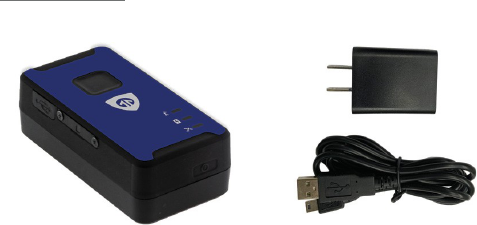
What’s Inside
Spark Nano 7
Wall Charger
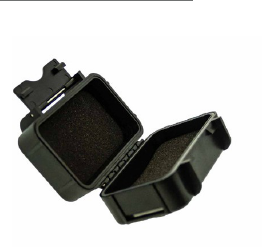
Optional Accessories
Weatherproof Magnetic GPS Case
Reduces the risk of physical damage to
your device and allows you to mount it on
any metallic surface

Spark Nano 7
1.
Power Button
2.
Charging Port
3.
Panic Button
4.
Cell LED (Green)
5.
Power (Red)
6.
GPS LED (Blue)
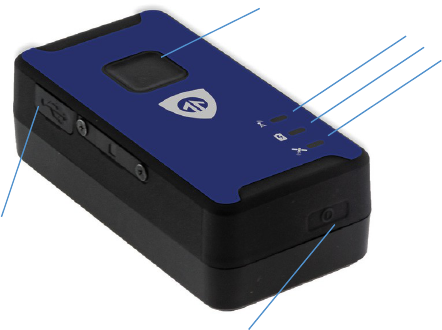
3
4
5
6
2
1

LED
Cell LED: Green Light
1.
A fast flash indicates the device is searching for a network.
2.
A
slow flash indicates the device is registered on the network.
3.
When the indicator light is not on, the device modem is not
connecting to the network.
Power LED: Red Light
1.
A solid red power indicator means the charging cable is connected to the
device and the charging cycle is complete.
2.
A flashing red indicator means the charging cable is connected and the
device is currently charging.
3.
When the device is powered on and off, the red indicator will also flash.
4.
A slow blinking red indicator light is a low power alert.
5.
The power light will not be on during normal device operation.
Note: If the device has not been charged for a long period of time, the
red power light may take a few moments to light up and start blinking. If
your device has not been charged for a while and the light does not
light up when the device is plugged in, please allow at least 6 hours of
charging time and then try to power the device on again.
GPS LED: Blue light
1.
A fast blue flash indicates the device is attempting to find a GPS fix.
2.
A intermittent solid blue blink will indicate it has found a GPS fix and is
acquiring a location to send to the platform.
3.
A slow steady blue blink will indicate a potential problem getting a GPS
fix.

Getting Started
You should have received an email containing your default login information;
this will be used to configure your device and view tracking information (which
will be covered later in this user’s guide).
The first step in using your Spark Nano 7 is to charge it. Plug the (included)
AC adapter into a wall outlet. Then, gently insert the mini-USB charging end
into the charging port of your device. Ensure the mini-USB ends are properly
aligned.
Charge your device for at least 5 hours prior to first use. When fully charged,
the red light will turn solid (and then will stop glowing after a prolonged period of
remaining plugged in after it’s fully charged). When the device is done charging,
disconnect the cable and press the power button to turn the device on. Make
sure all the rubber port covers are securely in place before use.
It is important that the tracker has a clear view of the sky. Since the device is
motion-activated, it is not sufficient to leave it outside or on a window sill for it to
register. It must be moving in order to register and report its first location.
To power on the unit, hold down the power button for around 3 seconds,
also plugging the unit in to power will power it on. The power light will light up
briefly indicating power on. To power off the unit, hold down the power
button for around 3 seconds. You’ll see the power light begin to flicker
indicating it will power off soon.
Note: It can take up to a minute for the device to power down after the red
indicator light turns on.
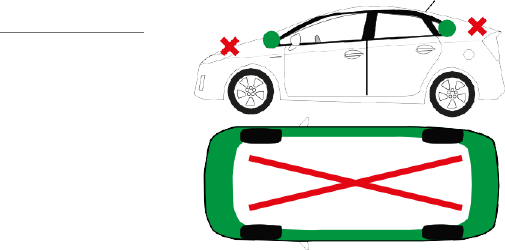
Placing Your Device
*Place in green zones for best results.
Your Spark Nano will always
give the most accurate
location data when it has
a clear view of the sky. It is
capable of transmitting and
receiving through materials
like glass, plastic, and cloth,
but is not able to transmit
through metals. Keep this in
mind when placing the device.
Avoid placing the device in the trunk of a vehicle. It may or may not report from a
glove compartment or underneath a seat. This interference can vary from vehicle to
vehicle, however, as all automobiles are constructed differently.
If
you want to track covertly, the Weatherproof Magnetic GPS Case may be the
best solution for you. When placing the device beneath a vehicle, be sure that the
side with the LEDs is facing down, towards the ground, and that it is as close to
the edge of the vehicle as possible.

Customizing and Tracking Your Device Via a Web Browser
_______________________________________________
To start tracking your Spark Nano 7, open a
browser window and
go to
www.BrickhouseSecurity.com. Hover your cursor over the Login tab on the top right of
the website and click on GPS followed by the Locate GPS tab.
Using your temporary credentials that were provided by email, enter your login
information and click the Enter button. You will then be prompted to change your
password. After you do that, the Monitoring page will appear and your device's last
reported location will be centered on the map.
You can also login directly to the platform by visiting locate.brickhousesecurity
.com
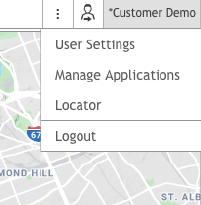
User Settings
___________
In order to choose user parameters,
click on the username in the right
corner of the top panel and click the
‘User Settings’ button in the dropdown
menu.
Next, follow these steps:
• Indicate your time zone.
• Select the type of Daylight
Savings Time used in your
region.
Note: Make sure you have selected the above mentioned settings properly,
because t
hey could influence the accuracy of data presented in reports,
messages, and elsewhere throughout the system.
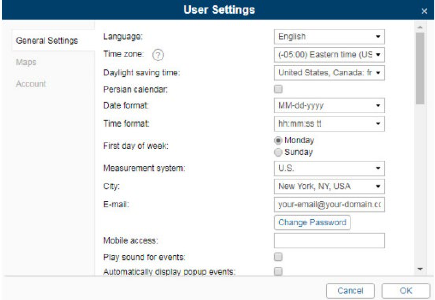
User Settings Interface
___________________
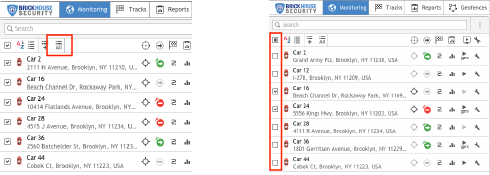
Enable Unit Visibility
_________________
Before editing a unit, make sure that your devices are being displayed on the
left side of the Monitoring tab as well as on the map on the right. To enable this
visibility, please follow the steps with corresponding images below.
Next, check the box located on the left
side of the unit. If you have multiple units,
you can check the top box to select all. If
you want to hide a unit in the future,
uncheck the box to the left of that unit.
First, click on the 'All' button as
shown below.
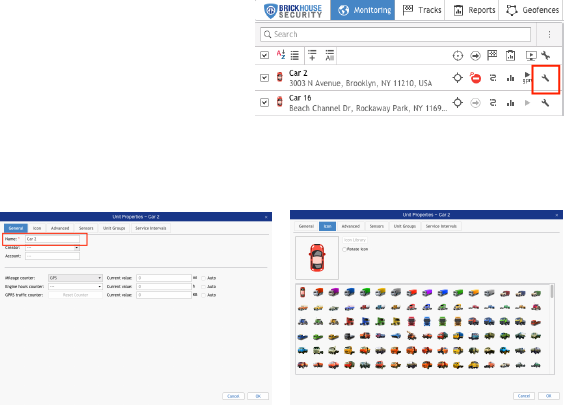
Edit Unit Name and Icon
____________________
You can edit some of the unit
properties including name
and icon by clicking on the
wrench to the right of the
unit.
To change the name, type it into
the area shown below and click OK
From this same menu, clicking on
the Icon tab will bring you to the
library.
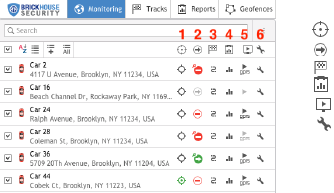
Monitoring Tab
______________
This is the main interface of the platform and includes the work area (shown
below) as well as the map on the right side. From here, you can click on a unit
icon to expand it and see additional information, center over a specific unit, see
whether it's moving or stationary, run a quick track or report, as well as execute a
command if it's available for your device.
(1) Center over a specific unit
(2) See a unit's current motion state
(3) Run a track for the current day
(4) Run a Trips & Stops report
(5) Ping your device (if available)
(6) Change unit properties
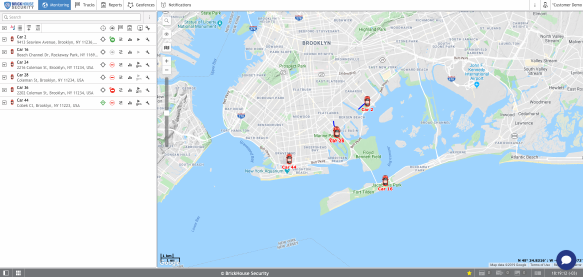
From here, you can see additional information about a unit by clicking on
its icon in the work area or hovering over it on the map. This will show
you the last time it reported as well as its current location, direction, and
speed. To watch over a specific unit, click on the bullseye icon in the
work area (shown in #1 on previous page) or directly on the map.

(1) Click the magnifying glass icon to search for an address, unit or geofence
(2) Click the eye icon to select the layers you would like to be visible on the map
(3) Click this icon to select your map source
(4) You can zoom in and out of the map by clicking the +/- icons or dragging the bar
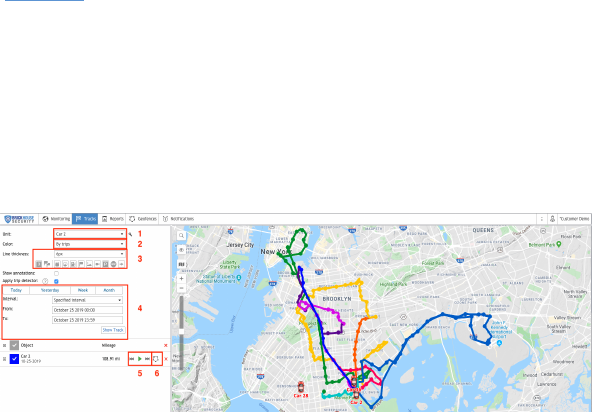
Tracks Tab
The Tracks section allows you to see your tracking history on the map:
(1) Select a unit
(2) Select whether you would like it to be
a single line or separated by trip (color)
(3) Select the line thickness and icons you would like to overlay on the track
(4) Choose a time interval or enter a specific range
(5) Click the directional arrow to move along the track or the play icon for a Google
Street View playback (if available for the locations visited)
(6) You can choose to save the current track as a Geofence
To close the current Track, click on the X icon in the work area
Tip: Hover over any point on the track to see the address, time of visit, and speed
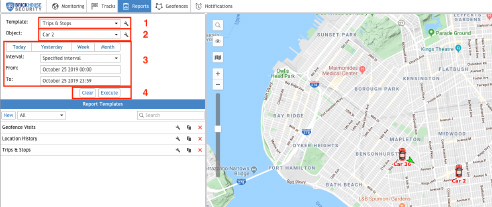
Reports Tab
___________
The Locate GPS tracking platform comes preloaded with some default report
templates that have been customized to suit your needs. See below for instructions
on how to execute
a report and the next page for how to read and export the data.
(1) Select the report type
(2) Select the device you would like to run the report on
(3) Click on a predefined time interval or enter your own
(4) Click Execute to run the report and Clear once you're done reviewing the results

Below is an example of how the "Trips & Stops" report looks once its executed
within the platform.
(1) This is where you navigate between the different sections of the report.
(2) You can click on the eye icon to the left of each trip to make its Track appear
on the map.
(3) Click on one of these icons to email, print, or export the report in PDF or XLS
format.
Once you're finished reading the report, just click Clear.
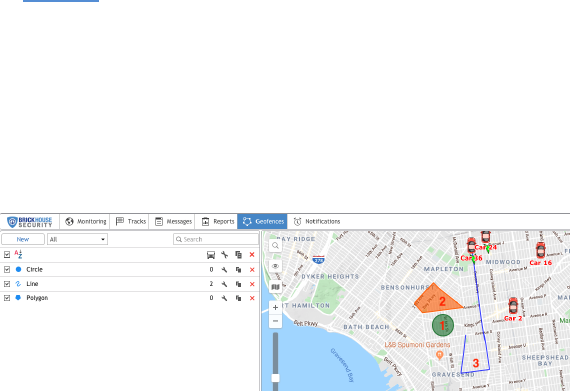
Geofences
A Geofence is a virtual perimeter around a predefined area that can be
utilized in a variety of ways on the Locate GPS tracking platform. You can
use it to be notified if your device has entered or exited that area or run a
historical report on all visits and time spent within the area.
There are 3 types of geofences:
(1) Circle - Point of the map with a radius around it
(2) Polygon - Add as many points as you want to define a specific area
(3) Line - Use this type to be alerted if your device has entered or exited a route
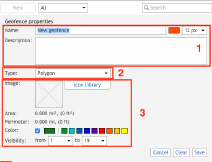
To locate the area where you would like to create your first geofence, either
manually drag the map to that destination or search for a specific address
by clicking the magnifying glass icon on the map.
Next, click on the "Geofences" tab followed by the "New" button, and then:
need to display the geofence on the map.
(1) Add a name and description for your geofence.
(2) Select the geofence type. Once you do this
step, start to define it on the map based on the
following guidelines:
• Circle: Double click anywhere on the map to
set the center and then determine the radius.
• Polygon: Add at least 3 points to the map.
You can then drag the points to define your
perimeter. Double click on your last point if
you'd like to remove it.
• Line: The line option allows you to connect
the points along a specific route that your
device takes. Change the width on the left to
fit your needs (e.g., wide enough to cover the
entire highway).
(4) Click Save and then check the box next to your
new geofence
(3) Once you define your
geofence, you can choose to
add an image or assign a
color and transparency.
Click Save and repeat as
needed.
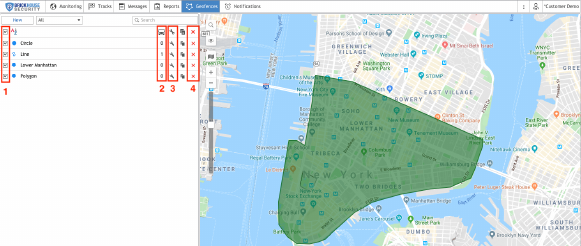
(1) Once you've created your geofences, check the boxes next to them to
make them visible on the map.
(2) Here you can see how many devices are currently within each geofence.
(3) Click the wrench icon to edit an existing geofence.
(4) Delete a geofence you don't need anymore by clicking on the X icon.
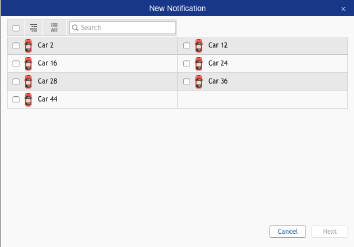
Notifications
__________
Notifications are used to alert you based on predetermined triggers, like
geofence entry or exit, speeding, or excessive idling. You can be notified
by email, text message, mobile app notification, or all of the above. To
create a new alert, go to the Notifications tab and then click "New". You
will then see the window below:
Check the boxes to select the devices you
would like this specific notification to apply
to and click Next.
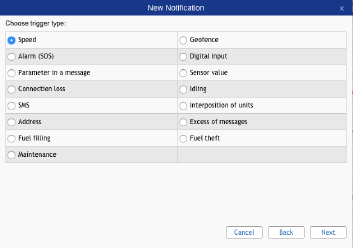
You will then see the following window. Here you will select the
trigger type that will activate your notification. Depending on your
device type and use-case, not all of these will be useful for you.
Once you click Next, the settings on the next couple of pages
will depend on the notification type you selected.
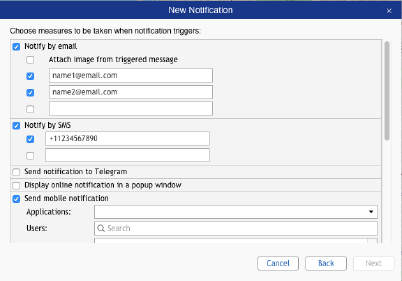
Below is the next window you will see during the set up of your notification.
Here you will decide what actions you would like the platform to take if any
of the parameters you've selected in the previous windows are triggered.
<RXFDQFKRRVHWRHQWHUDQHPDLO address, phone # (+1 followed by 10 digit
number), and/or receive a notification through your mobile app. To receive
an app notification, you will have to select your app in this window under the
"Application" dropdown and enable notifications in the app settings. Once
you're finished entering these settings, click on the Next button.
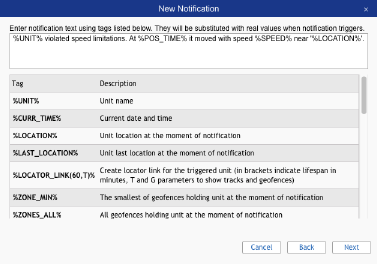
In the next window, you will be asked to enter the text you'd like to see
when you receive the notification. The text will automatically be
different based on the notification type. We recommend leaving this
as is and clicking Next.
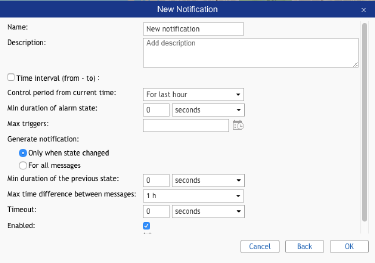
This is the final window of the notification creation process. The only required
field is the name, but you can also choose to add a description, choose a time
interval that you'd like the notification to be active, or enter the maximum
number of times you would like that notification to be triggered. We don't
recommend changing any other settings. Click OK to complete this notification.

Once you have created all your notifications, you will see them listed in
the work area on the left. You can manage your existing notifications
here. Below are descriptions for each column.
(1) Enable/disable a notification
(2) See what actions have been set up when this notification is triggered
(3) Shows you how many times a notification has been activated
(4) Shows you how many devices the notification is applied to
(5) Edit an existing notification by clicking on the wrench icon
(6) Delete an existing notification you no longer need by clicking on the X
Getting to Know your BrickHouse Locate GPS Mobile App
_______________________________________________
The BrickHouse Locate GPS mobile app is available on the Google
Play and iOS App Store and can provide you with the same advanced
tracking functionality as the web-based GPS platform. The app can be
used on any smart phone or device that runs on Android or iOS.
Some of the features included in the app are:
• Tracking of current device location as well as historical data
including all trips and stops
• Ability to run and externally share Reports that are available
on the web platform
• Ability to receive and manage notifications
The next few pages will include screenshots and descriptions of
the app features and settings.
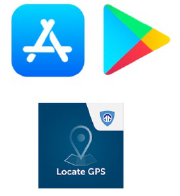
Download the BrickHouse Locate GPS mobile
application from your iOS App Store or Google Play store.
Please have your login credentials ready to access the platform through the
mobile application. You should have received your login information via
email when your device was activated.
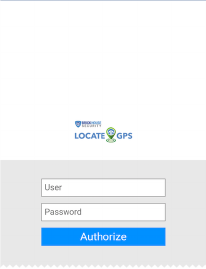
Login Screen
_____________
Enter the same username and
password you use on the web
platform to login to the mobile app
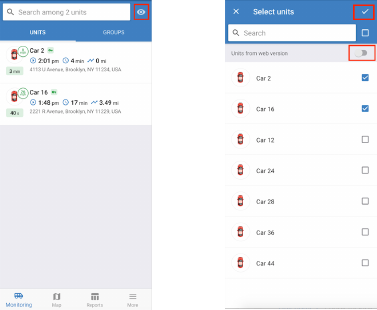
Unit Selection
Shown below is the screen you'll see when you open up the app. The first
step is to click on the eye icon in the top right corner of the screen. From
here, you will need to select the devices you'd like to appear. You have
the option to select all, select individually, or match whatever is on the web
platform. This is the recommended option. See highlighted fields below:
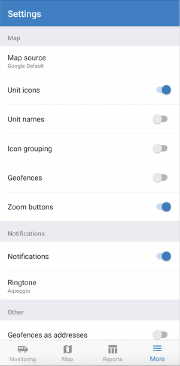
App Settings Page
________________
Note: Geofences will need to be created through a Web Browser
before accessing and viewing them via the Locate GPS mobile app.
To enter the settings page, tap on the
"More" button at the bottom right corner of
your screen. You will reach the page
shown here, where you can choose your
map source and decide whether you'd like
certain things to be visible on the map,
such as unit icons and names, geofences
and zoom buttons.
Also, enable Notifications if you would like
to be alerted through the app if any of
your alerts are triggered based on the
criteria you set up on the web platform.
You will then receive app notifications if
you selected "Send mobile notification" as
one of the actions to be taken.
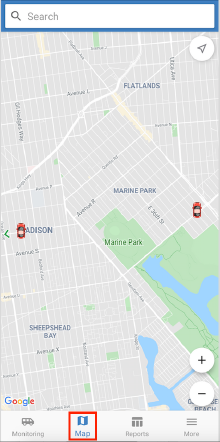
Map View
________________
Tap on the "Map" icon to reach the map
screen shown to the right. Navigate the
map by manually dragging it or using the
zoom buttons on the bottom (if enabled in
the visibility settings).
You can now bring up detailed
information about a specific device by
tapping on its icon or searching for it by
name in the search box on top.
Once you select a device, you will be able
to see current tracking information as well
as historical data.
In addition to the Map page, you can also
select a device from the Monitoring page.
Tap the buttons on the bottom to switch
between pages at any time.
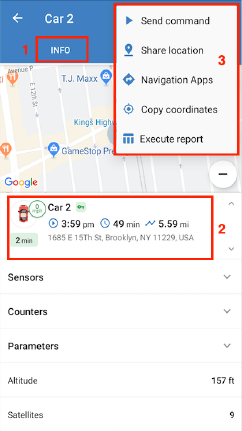
Tracking your Device
__________________
This page shows you the most current
tracking information for the device you
selected. You should be on the "Info"
tab labeled (1) on the right.
(2) Shows us the latest data, including
the device's current location, last time it
reported, its speed, as well as
information from the last trip tracked,
such as the length and distance of the
trip.
(3) If you click on the three vertical dots
at the top right, a drop down menu will
appear allowing you to send a
command, share the device's current
location, navigate from your location to
that device, or execute a report.
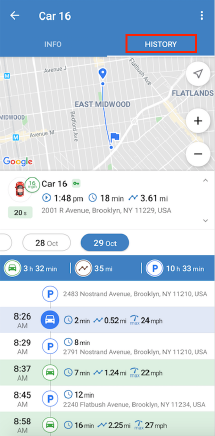
Tracking your Device (Historical Data)
_______________________________
To see the tracking history of your
device, tap on the "History" tab.
From here, you can see all the trips
and stops that your device made on a
particular day. For each trip, you'll see
the duration, distance, and average
speed. To make a Track from a
specific trip appear on the map, select
a date and then tap on the trip of your
choice.
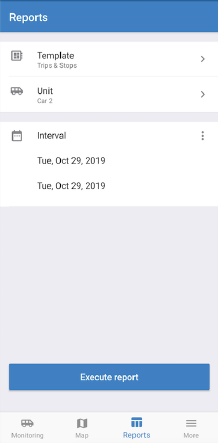
Report Execution
_______________
The app also allows you to run any
report that's available on the web
interface of the Locate GPS
platform.
To run a report, select the report
Template, Unit and Interval,
followed by tapping on the Execute
report button.
The report will open as a PDF on
your mobile device that you can
then email to yourself or others.

Thank you for choosing BrickHouse Security for your GPS
tracking needs. For further support with the Locate GPS
platform or anything else, please reach out to us by email,
phone, or live chat at BrickHouseSecurity.com.
Email: [email protected]
Phone: 800-654-7966
You can also find lots of learning materials including instructional videos
on how to use specific features of the Locate GPS platform at:
help.brickhousesecurity.com
